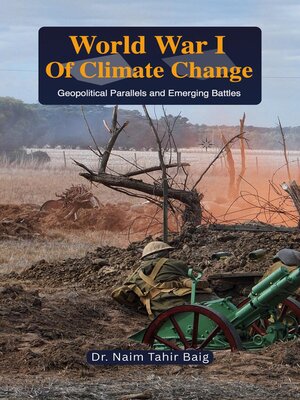World War I of Climate Change
ebook ∣ Geopolitical Parallels and Emerging Battles
By Dr Naim Tahir Baig

Sign up to save your library
With an OverDrive account, you can save your favorite libraries for at-a-glance information about availability. Find out more about OverDrive accounts.
Find this title in Libby, the library reading app by OverDrive.



Search for a digital library with this title
Title found at these libraries:
| Library Name | Distance |
|---|---|
| Loading... |
BOOK DESCRIPTION
World War I of Climate Change: Geopolitical Parallels and Emerging Battles
A research-based analysis revealing why climate change resembles the Great War more than any modern conflict—and what this means for our survival.
In 1914, a web of entangling alliances, resource competition, and technological disruption transformed a regional crisis into global catastrophe. Today, as climate change reshapes geopolitics from the melting Arctic to cyber-vulnerable energy grids, Dr Naim Tahir Baig argues we face remarkably similar dynamics that could escalate into unprecedented planetary conflict.
World War I of Climate Change moves beyond conventional climate discourse to reveal six critical battlefronts where environmental crisis intersects with international security. From state-sponsored cyber attacks on renewable energy infrastructure to mass climate migration creating new "Schlieffen Plans" of population movement, from Arctic resource nationalism echoing pre-1914 colonial scrambles to geoengineering technologies as dangerous as chemical weapons, this book exposes the "doom loop" where geopolitical tensions amplify climate damage, creating ever-greater instability.
Drawing on cutting-edge research from cybersecurity threat intelligence, migration studies, and Arctic geopolitics, Baig synthesizes data from frontline climate impacts—including the Ukraine war's massive emissions surge and rising eco-anxiety among global youth—to demonstrate how climate change is already reshaping international relations. Unlike World War II mobilization metaphors that dominate climate policy, the WWI analogy captures the grinding, attritional nature of our crisis and the risks of catastrophic escalation through miscalculation and entangled commitments.
Written from the Global South perspective, this book exposes the dangerous hypocrisy of wealthy nations preaching net-zero while expanding fossil fuel infrastructure, creating the same tensions between rhetoric and reality that characterized pre-war diplomacy. Baig reveals how blockchain technologies might serve as "digital neutrality pacts" and why preventive climate diplomacy offers our best hope for avoiding the escalatory trap that consumed Europe over a century ago.
World War I of Climate Change is essential reading for policymakers, security analysts, climate professionals, and anyone seeking to understand why traditional approaches to climate action have failed—and what we must do differently before our planetary crisis becomes an irreversible global war.
What readers will discover:







